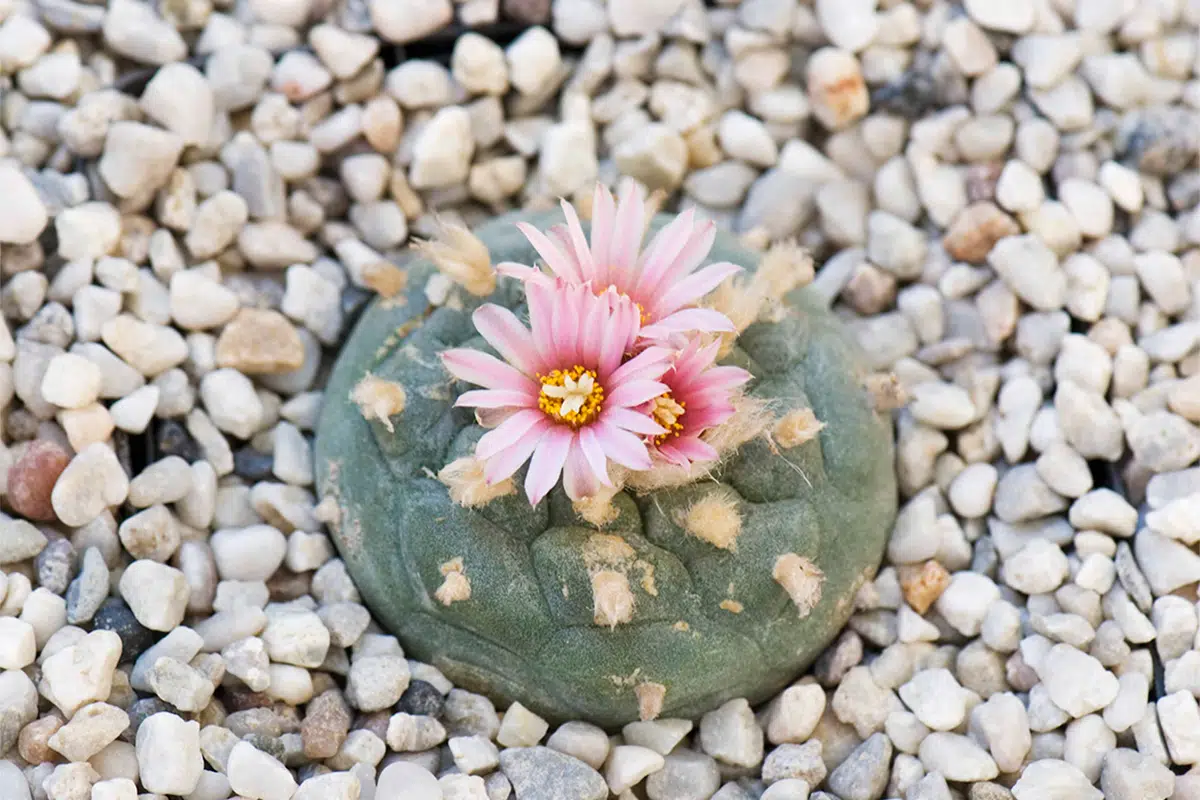Leaders of the Native American Church of North America (NACNA) held multiple meetings with congressional offices last month to advocate that federal funding be dedicated toward efforts to preserve habitats where peyote can be grown.
The psychedelic cacti is used in religious ceremonies that are already federally protected, but its supply is limited and NACNA members are asking for assistance to ensure it can remain available for generations to come.
While peyote is a Schedule I controlled substance, the church has been permitted to cultivate, harvest, and use the cacti under a 1994 amendment to the American Indian Religious Freedom Act. The primary peyote habitat is located near the U.S.-Mexico border in Texas, and NACNA is seeking $5 million in U.S. Department of Agriculture (USDA) or Interior Department funding to conserve the ceremonial medicine.
This has become especially necessary as climate change and unsustainable agriculture practices have threatened peyote conservation efforts. Some Indian leaders have also voiced concerns about increased non-Native peyote use amid the psychedelics decriminalization movement in recent years.
Peyote is a uniquely vulnerable crop, as it takes over 10 years for a cactus to mature and start flowering. To that end, NACNA is asking for Congress to step up with aid.
Specifically, church leaders and the National Congress of American Indians (NCAI) are lobbying lawmakers to allocate $5 million in funding from USDA’s Conservation Reserve Program or Interior’s Office of the Assistant Secretary for Indian Affairs to provide compensation to landowners who agree to convert their property to protected peyote habitats.
How to Grow Shrooms Bundle
Take Both of Our Courses and Save $90!
The church is also asking for the establishment of an advisory committee comprised of tribal, state, and federal representatives, as well as private landowners, to support the continued, long-term conservation of the psychedelic cacti, according to Native News Online, which first reported on the lobbying push.
On Facebook, NACNA shared a list of meetings that were with scheduled congressional staff. Leaders secured meetings to discuss the issue and funding request with staff of more than a dozen offices for individual lawmakers and committees.
That included meetings with the offices of Sens. Martin Heinrich (D-MN), John Tester (D-MT), Kevin Cramer (R-ND), Mike Rounds (R-SD), Tammy Baldwin (D-WI), John Hoeven (R-ND), John Thune (R-SD) and Reps. Ruben Gallego (D-AZ), Ann Kirkpatrick (D-AZ), Tom Tiffany (R-WI), and Matt Rosendale (R-MT).
Members also erected a tipi on the grounds of the National Mall to help draw attention to the issue, which is gaining more mainstream interest as cities and states across the country move to decriminalize psychedelics and promote research into the therapeutic potential of a variety of entheogenic substances.
“Prayers and songs will be offered that our heartfelt words in the meetings with officials will be taken into consideration when decisions are made about the conservative and preservation of the Holy Sacrament’s habitat,” NACNA wrote in a Facebook post.
The specific topic of peyote has created some tension between advocacy and Native communities. Some lawmakers and activists have revised psychedelics reform proposals to account for sustainability concerns from indigenous groups who use peyote-derived mescaline for religious ceremonies.
Read: Native Tribes Need More Say in the Psychedelic Movement
Last year, the Santa Cruz City Council amended a psychedelics policy to remove peyote from the list of plants and fungi that had been effectively decriminalized due to those concerns, for example.
Other advocates have pushed for decriminalizing only synthetic mescaline, while preserving non-Indigenous criminalization for the peyote-derived psychedelic to ensure that the Native American supply is not further disrupted.
While NACNA is stepping up its push to provide funding to protect peyote habitats, the church has been discussing methods of promoting conservation for over a decade.
The church passed a resolution in 2009—ten years before Denver became the first U.S. city to decriminalize psilocybin mushrooms—that called for the formation of a working group “to address the issue of access to the peyote gardens and access to peyote.”
The measure stated that the working group would “explore all possible options to protect access to peyote, including but not limited to potential legislation creating a peyote reserve/refuge.”
Congress hasn’t quite kept pace with the local and state psychedelics reform movement, but more lawmakers have started engaging on the issue. For example, Rep. Jared Huffman (D-CA) told Marijuana Moment earlier this month that psychedelics could be a therapeutic “game changer.”
Federal health officials are also taking note of the increased adult use of certain entheogenic substances. As National Institute on Drug Abuse (NIDA) Director Nora Volkow put it earlier this year, the “train has left the station” on psychedelics.
The U.S. Department of Health and Human Services (HHS) recently said that it is actively “exploring” the possibility of creating a task force to investigate the therapeutic of certain psychedelics like psilocybin and MDMA in anticipation of federal approval of the substances for prescription use.
That came in response to letters from bipartisan congressional lawmakers, state legislators and military veterans, who implored the HHS secretary to consider establishing an “interagency task force on the proper use and deployment of psychedelic medicine and therapy.”
*This article was originally published by Marijuana Moment.

DoubleBlind is a trusted resource for news, evidence-based education, and reporting on psychedelics. We work with leading medical professionals, scientific researchers, journalists, mycologists, indigenous stewards, and cultural pioneers. Read about our editorial policy and fact-checking process here.

DoubleBlind Magazine does not encourage or condone any illegal activities, including but not limited to the use of illegal substances. We do not provide mental health, clinical, or medical services. We are not a substitute for medical, psychological, or psychiatric diagnosis, treatment, or advice. If you are in a crisis or if you or any other person may be in danger or experiencing a mental health emergency, immediately call 911 or your local emergency resources. If you are considering suicide, please call 988 to connect with the National Suicide Prevention Lifeline.



